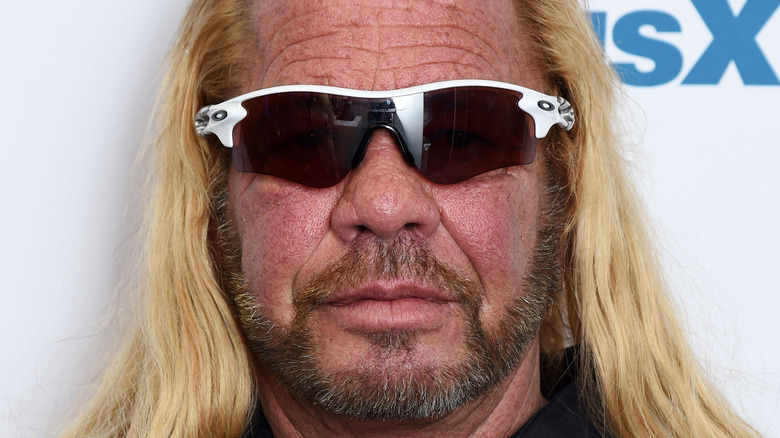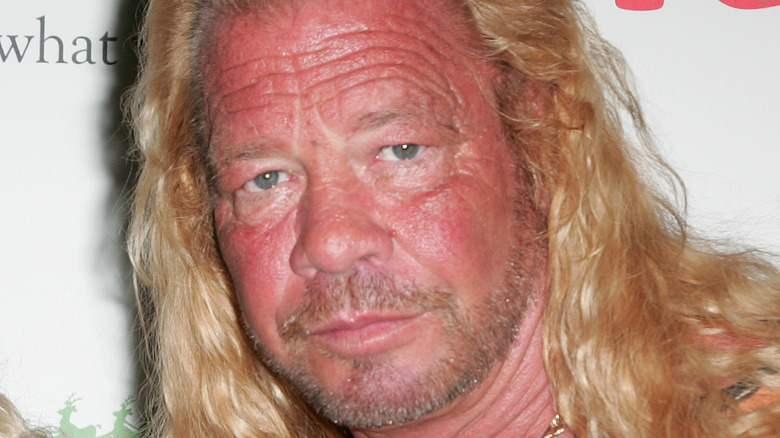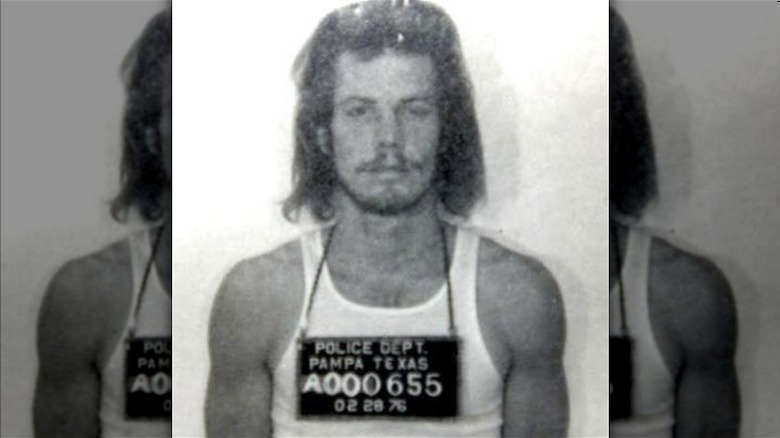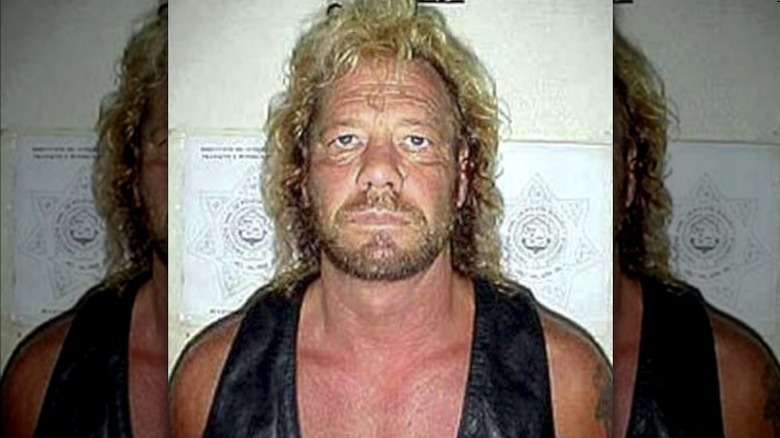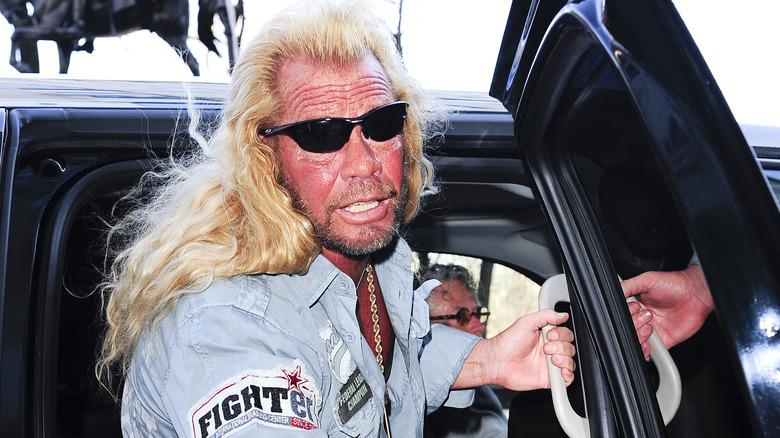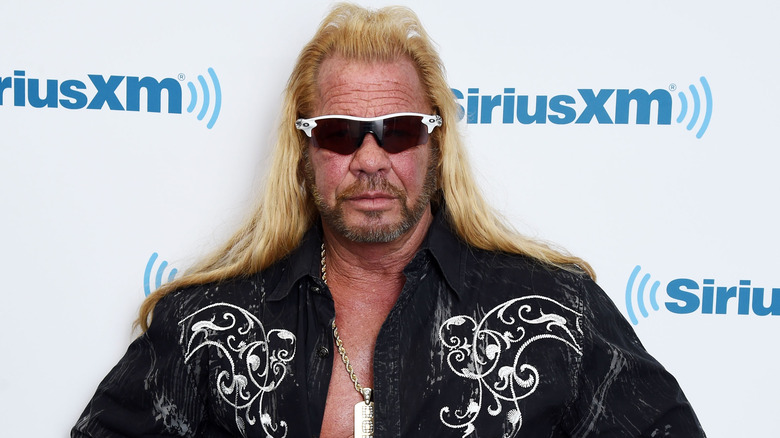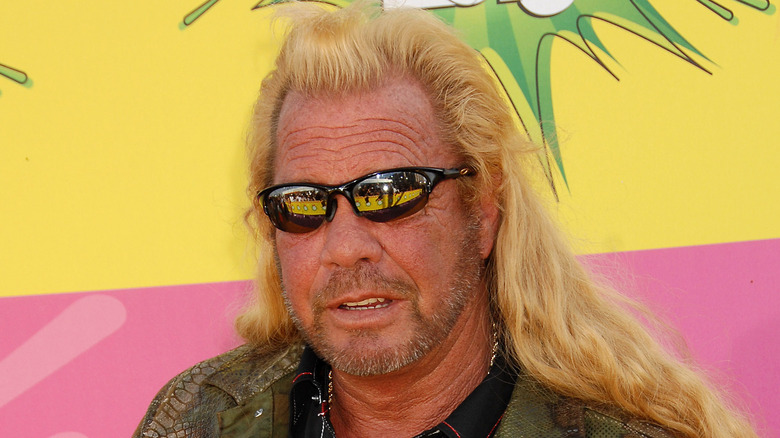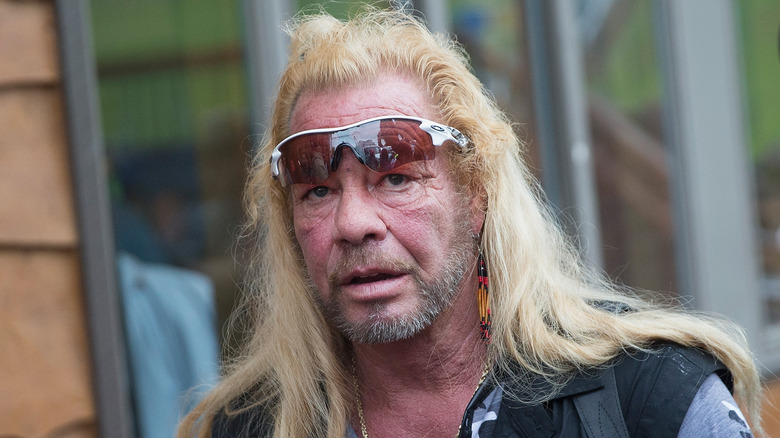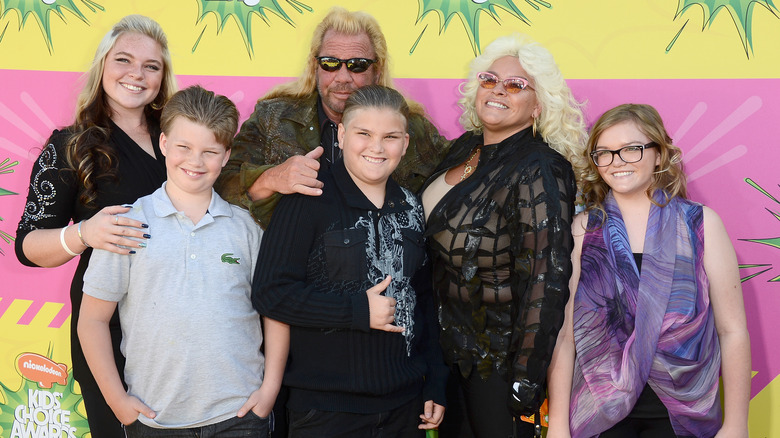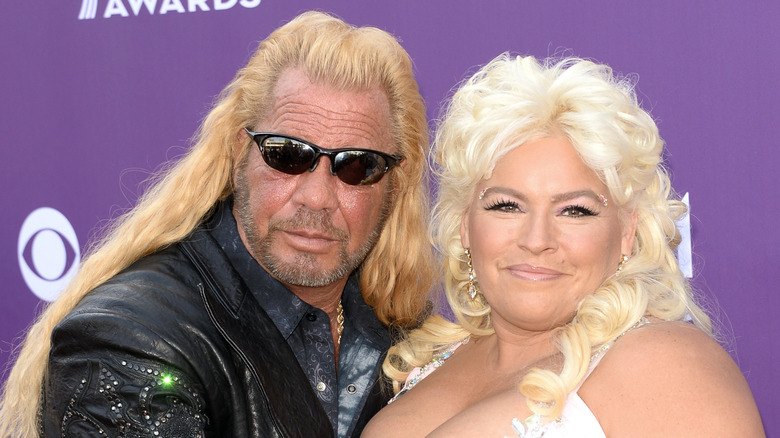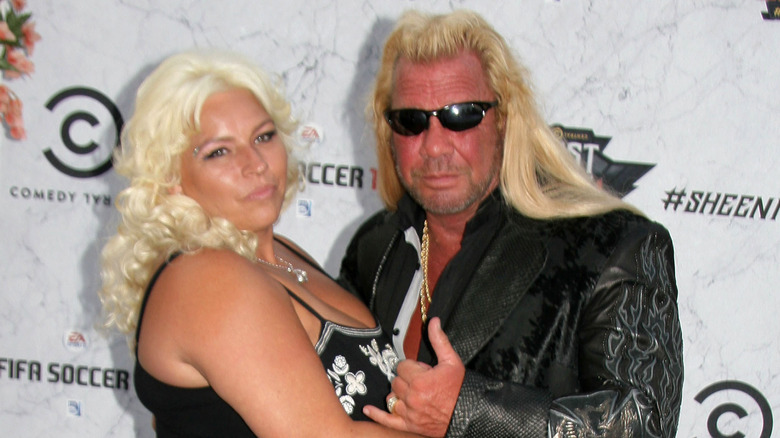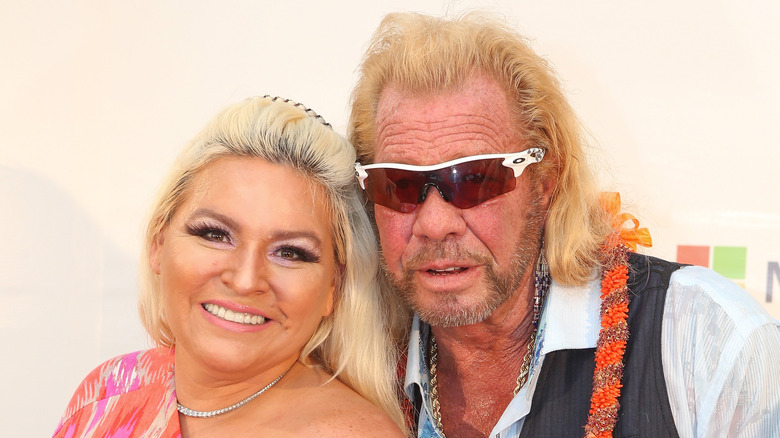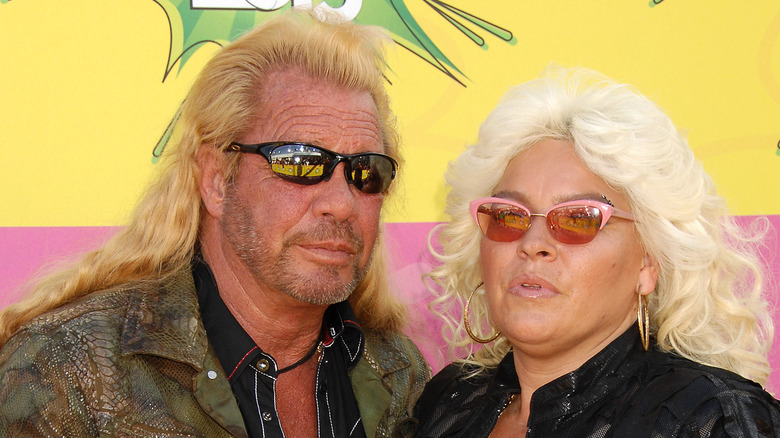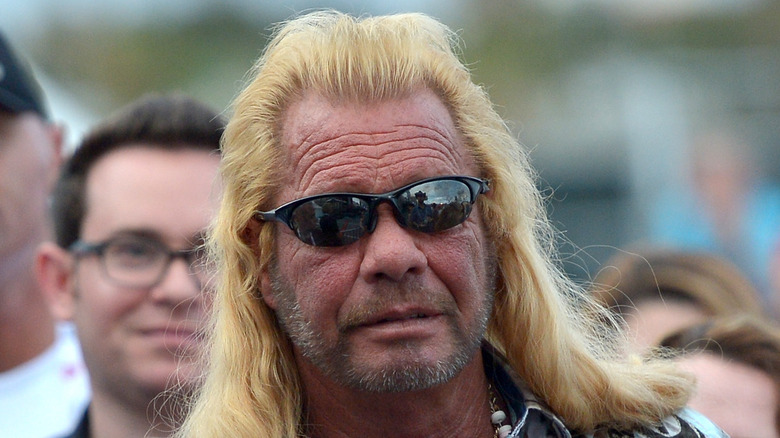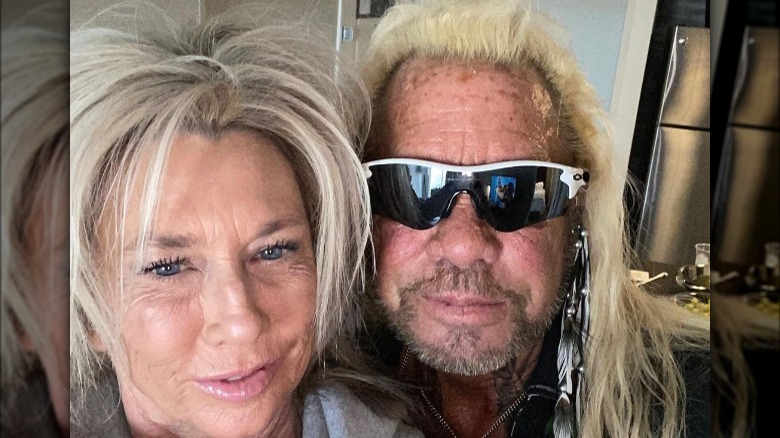Here's How Much Dog The Bounty Hunter Is Really Worth
The following contains references to sexual assault and child abuse.
Dog the Bounty Hunter, aka Duane Chapman, has made a name for himself in the business of bounty hunting, a career as precarious and dangerous as it sounds. For the uninitiated, a bounty hunter is simply "a skilled professional who is hired by a bail bondsman to find and capture a fugitive," per BountyHunterEdu. The capture comes with a financial reward, of course, known as a "bounty," which makes it sound like we're in pirate territory.
In fact, there's a legendary element to bounty hunting. The early days of bounty hunting in the U.S. go way back to the era of the Wild West when skilled trackers could make money by studying wanted posters and finding the fugitives on them.
After deciding to become a bounty hunter, Duane took this long tradition and made it applicable to the 21st century, complete with reality TV and social media, which he uses to get tips from fans. Bounty hunting has become quicker and much more publicized but, arguably, just as dangerous. And yet, Duane has remained in the game for decades, building up a decent net worth for himself. According to Celebrity Net Worth, Duane is worth $6 million.
While this is well and good (and certainly a more eclectic way to make an income than most), Duane has had a tough time keeping afloat financially and has faced some major hurdles with money. Bounty hunting, by all accounts, isn't as straightforward as reality TV can make it look!
Duane Chapman's early life was tough
In his 2007 memoir, "You Can Run But You Can't Hide," Duane Chapman revealed that his family "lived a decent middle-class life." However, his childhood was far from idyllic. "As a young boy, I never knew that other kids didn't get hit by their dads," he wrote. I thought it was a rite of passage to have my father knock me around. I simply didn't know anything different."
Duane tapped into the emotional pain. "I was expected to take it like a man," he wrote. "But I wasn't a man. I was a young boy looking for love and approval from my father. I was desperate for his affection, so I ignored the pain. Sometimes I even thanked him for it, as if I deserved what he doled out."
With such a tough family situation, Duane faced struggles as a teenager, too. He dropped out of school when he was 13 years old, ET notes. He later ran away from home, and at age 16, he became a member of a motorcycle gang. Interestingly, this newfound family gave him the name he still uses today. "I always talked about God, like I wouldn't rob a church," he told ABC News. "We had a guy named Preacher, a John the Baptist, and they named me Dog because it's God spelled backwards ... and I was always there when they needed it." While it might have felt like a new family, Duane's lifestyle meant that he made some poor decisions.
If you or someone you know may be the victim of child abuse, please contact the Childhelp National Child Abuse Hotline at 1-800-4-A-Child (1-800-422-4453) or contact their live chat services.
The bounty hunter's prison sentence
Duane Chapman's early life meant that he was that much more likely to get in trouble with the law. The soon-to-be bounty hunter admitted this himself in his memoir "You Can Run But You Can't Hide."
"I spent the first twenty-three years of my life on the wrong side of the law," Duane wrote. "For most of my childhood, I ran with gangs and bikers. The only thing I knew about the law was a thousand ways to break it. I got pretty good at that."
Then something happened that irrevocably changed Duane's life and ultimately led him to bounty hunting. He "was waiting in a car" in Pampa, Texas, when a friend got into an altercation with a reported drug dealer, per The Sun. The "friend accidentally shot and killed" the man, and per Texas law, Duane was charged with first-degree murder because of his indirect involvement in the death. In 1976, he received a five-year prison sentence.
While the situation was a dark one, it led Duane to his career, and bounty hunting became so much more to him than just a job. "It took a murder-one conviction to make me decide to change my life from committing crime to fighting it," Duane wrote in his memoir. "It might seem strange that a man with my criminal past is so passionately concerned with what happens to the victims of crime." His journey from one side of the law to the other would also turn out to be lucrative — eventually.
How a felony later impacted Duane Chapman's career and finances
While having a felony led Duane Chapman to his ultimate career of being Dog the Bounty Hunter, his criminal past has also significantly impacted his life as well as his finances. In 2012, Duane was slated to appear on "Celebrity Big Brother" in the United Kingdom. However, the bounty hunter was denied a visa because of his felony record, HuffPost reports, putting an ax in his wish for more TV exposure. Duane, who was living in Hawaii at the time, said, "It's something that follows you the rest of your life, no matter who you become or who you are. I'm not proud of it." In 2018, The Sun reported that "Celebrity Big Brother" stars were making anywhere from $53,000 to almost $1 million, so he missed out on a decent paycheck.
Duane spoke about the restrictive impact of a felony 36 years later. "It feels terrible," he told HuffPost. "I'm dumbfounded. I can't believe it, after all these years, especially when we've been on television for the past nine years."
In addition to restricting Duane's global mobility, the felony has also restricted what he can do as a bounty hunter. As The Sun points out, convicted felons are not permitted to carry firearms, so when Duane is on a job with his team, he'll carry a taser, while everyone else has a gun. Obviously, he's protected in a group, but it would certainly mean higher vulnerability in such a dangerous field.
The moment Dog was first called a bounty hunter
Duane Chapman has made an impressive career off of his unconventional choice to become a bounty hunter. And while we know that the 'Dog' in his TV name, "Dog the Bounty Hunter," came from his early years in a motorcycle gang, there's actually a great story about the first time he got called a bounty hunter.
"While I was in prison, I became the warden's barber, so that means all the guards were my friends," Duane told Fox News in 2007. "One guy went to break and run one day, an inmate, and I jumped him and just — the guard were going to shoot him in the back." Then came the life-changing moment. "And as the guard walked up when I was on top of the inmate apprehending him, and he threw down the handcuffs and said, 'Hook him up, bounty hunter,'" Duane recalled. "That is what started the career."
So what kind of income was Duane looking at once he began bounty hunting for real? BountyHunterEdu gives an average breakdown of what someone in that field would make. If a bounty hunter is successful in 100-150 cases a year, they're looking at an annual salary of $50,000-$80,000. Each payment comes from a bail bond company. If an accused person the company has loaned money to takes off, the company then hires a bounty hunter to find them and typically pays 10-20% of the bail money.
Dog the Bounty Hunter's first big capture
Duane Chapman's first major win as a bounty hunter came in 2003 when he caught Andrew Luster, heir to the cosmetic company Max Factor. As The Hollywood Reporter notes, Luster "fled to Mexico" while he was on trial for drugging and assaulting three women. Duane, along with his son Leland Chapman and bounty hunter Tim Chapman, stationed themselves in Mexico, disguising themselves with pseudonyms, per The Sun. They successfully captured Luster in Puerto Vallarta. The high-profile case gave Duane and his team long-lasting credibility as bounty hunters.
Tragically, the capture was a financial loss for Duane. The issue was twofold. Firstly, Mexican law requires bounty hunters to have a clean record; Duane has a criminal record. Secondly, Mexican law insists that bounty hunters have an official contract with either a "bail bond company or law enforcement," per CBS News. Because Duane and his team were representing themselves, Superior Court Judge Edward Brodie said, "He went to Mexico and failed to comply with the law. I cannot condone vigilante justice." Duane and his team were arrested in Mexico and jailed for four nights.
Later, Duane made every attempt to cash in at least a portion of Luster's $1 million bail, the Los Angeles Times reported in 2003. Duane claimed that the hunt cost him $320,000 and that he at least wanted to recuperate that money. That didn't happen, but the case did put Duane on the map in the world of bounty hunting.
If you or anyone you know has been a victim of sexual assault, help is available. Visit the Rape, Abuse & Incest National Network website or contact RAINN's National Helpline at 1-800-656-HOPE (4673).
Duane Chapman's first TV show
Duane Chapman got his first TV deal in 2004, one year after capturing Andrew Luster. A&E created "Dog the Bounty Hunter," a series that was so successful it ran for eight seasons and had over 240 episodes," according to Variety. As is the case with popular reality TV shows, it made Duane famous, along with the rest of the "Dog the Bounty Hunter" cast, which included his sassy and vivacious wife, Beth Chapman, and some of his children, including Leland, Duane Jr., and Lyssa.
Duane thrived on fame and audaciously told The New York Times in 2020 that "God promised to make him famous." He also admitted that fame filled a void for him. "I need the attention," he said. "I wake up every day and say, 'Mirror, mirror on the wall, who's the baddest bounty hunter of them all?'" He further confessed, "I need love."
Part of the popularity of this A&E hit was its inclusion in the growing TV genre of "redneck reality." Arguably, one could say the genre started with the 1962 series "The Beverly Hillbillies," but in the early 2000s, there was a rash of "redneck" hits — think TLC's "Here Comes Honey Boo Boo," "Duck Dynasty," and later productions like the MTV "Teen Mom" franchise and Discovery's "Alaskan Bush People." The appeal of "Dog the Bounty Hunter" was not only this raw access to an American subculture but also the sense of justice. Good guys chasing bad guys never gets old.
Major financial drama from the A&E show
While A&E's "Dog the Bounty Hunter" was popular enough to last eight seasons, the show got canceled in 2012, according to Variety. Not only was it the end of a major income source for Duane Chapman and the rest of his family and crew, but there was also major litigation that held up the last of his pay. A producer on the series, Boris Krutonog, got into a long-running feud with Duane over money, The Hollywood Reporter stated in 2013. Their feud was six years running and continued as the series wrapped, with the two men arguing over millions of dollars. The outlet gave the impression that A&E expected a battle.
Per The Hollywood Reporter, A&E Television Networks "deposited $4 million of money from 'Dog the Bounty Hunter' with the idea that Chapman and Krutonog would tussle over the funds, and at the end of the battle, it would transfer the money to whomever emerged victorious." The two men did come to an agreement in 2013, but the way the funds were split was not disclosed.
On top of this, Duane had old, unpaid legal fees from the 2003 ordeal in Mexico when he captured Andrew Luster. TMZ reported that a lawyer helped him, but the two later sued each other after arguing over attorney's fees. The amount Duane owed was "$880,916 plus interest," so the money drama doesn't seem to end for Dog!
How Duane Chapman's relationships impacted his finances
It wasn't just his felony that impacted Duane Chapman's finances later in life. The bounty hunter went into the business in the first place because he had child support payments waiting for him when he got out of prison, according to Honolulu Magazine. A judge offered to cover a single payment if Duane captured someone who jumped bail, and Duane's success led to "more assignments."
Duane has 12 children, as ET points out, and the strain of family life, including its unexpected turns, has been a lot over the years. His first wife, La Fonda Sue Honeycutt, actually filed for divorce while Duane was serving time for his felony in Texas. He also had a child from a previous relationship with a woman named Debbie White, which was news to Duane. He told the National Enquirer, "I didn't know I had a son until I got out."
Over the years, Duane has faced challenges in his relationships with his children and has been estranged from many of them, per PopCulture. There was a serious fracture with his son, Tucker. A phone conversation between the father and son got leaked, and Duane could be heard using racial slurs when referring to Tucker's girlfriend. The outlet noted that there were rumors it was Tucker who leaked the conversation. The phone call led to a temporary production shutdown of A&E's "Dog the Bounty Hunter," OK! reported in 2007. While Tucker might have leaked the call, the blame for that really falls on Duane.
Drama with the bounty hunter's later TV contracts
After A&E canceled "Dog the Bounty Hunter" in 2012, Duane Chapman went on to star in several other spinoffs. Duane ended up working a lot with his late wife, Beth Chapman, whom he married in 2006, per Parade. Fun story: they met when Beth called Duane for bail money after she was arrested for stealing two lemons. It's a bounty hunter match made in heaven. (To be fair, Beth denied the lemon theft.)
The couple starred in "Dog and Beth: On the Hunt," which kicked off on CMT in 2013, per the Futon Critic. "Filming this show with CMT has given us a broader ability to reach our fans and serve our professional industry in a way no other bail agent ever could," Duane said of the new series. After the series ended in 2015, Beth told In Touch that the old system of cash bail was changing in the United States. "Our industry is under attack," she explained. "There are bail reform movements springing up across the country that would end the cash bail systems. This would be a disaster." The outlet also mentioned that Duane and his wife left CMT with "the rights to all their shows."
The duo went on to star in "Dog and Beth: Fight of Their Lives," a two-hour A&E special about Beth's cancer diagnosis. Then came "Dog's Most Wanted" on WGN America. The show concluded, as The New York Times notes, with Beth's death in the season finale.
Beth Chapman's death left Duane Chapman heartbroken -- and broke
Beth Chapman died in June 2019, and the grief hit Duane Chapman so hard that at one point he said, "I don't want to live," The New York Times reports. In addition to leaving Duane in pieces, her death also left him in a financial crisis.
Beth died of cancer, and the Chapmans racked up extensive medical bills during her years of treatment, the Times noted. In addition to medical expenses, Beth died with around $75,000 in unpaid credit card bills, The Sun exclusively reported. Both Hawaiian Airlines World Elite MasterCard and MasterCard sued Beth's estate over her unpaid debt. The outlet does note that while Duane is not "responsible for personally paying off the debt," he is the executor of her estate.
At the same time, the bounty hunter was also at risk of losing his house in Colorado. As The Sun reported, he owed $5,800.48 in unpaid taxes from 2019, and he had a $5,809.44 lien on the home. "I'm broke," Duane told the Times.
So what was his plan? Duane was on the hunt for Kameron Lawhead, a drug dealer who had skipped town. Beth was the one who wrote the bond, Duane told Fox News in February 2020. The bail was originally set at $1.5 million but later increased, and since Beth wrote the bond, Duane dedicated the hunt to her.
Would Dog the Bounty Hunter manage without a TV show?
"Dog the Bounty Hunter" and "Dog and Beth: On the Hunt" showed Duane and Beth Chapman doing their potentially dangerous job, while "Dog's Most Wanted" focused primarily on Beth's fight with cancer and her death. Following this, Duane had to figure out his next step, and for a brief time in early 2000, he was, uncharacteristically, without a TV show, The New York Times notes.
WGN ended up canceling "Dog's Most Wanted," The Sun exclusively reported in January 2020, and rumors swirled that it had something to do with a family feud. Seven months after Beth died, Duane proposed to her long-time friend, Moon Angell, on "The Dr. Oz Show." Some of the bounty hunter's children were angry about what they perceived to be an excessively quick rebound, while fans and family alike were concerned about Duane's health — he looked frail and exhausted on air.
Not only did Duane need the money from a new show, but his children also felt that a fresh series would put a much-needed pep in his step. An insider told The Sun that his children "are concerned how he'll manage with no show."
Things seemed to take a turn for the better when Deadline reported in September 2020 that the streaming service Unleashed! had announced that a new series, "Dog Unleashed," was on its way. However, in April 2021, Taste of Country reported that the series had been canceled over a breach of contract on Duane's part.
The reality show star's other sources of income
Duane Chapman wasn't done with financial hurdles. Prior to Beth Chapman's death, the couple faced changes in their business. Per Hawaii News Now, they used to operate Da Kine Bail Bonds in Honolulu, Hawaii, However, in January 2019, they had to close the location, which included a souvenir shop, because the site had been sold and the new owner had plans to demolish the building.
While the Chapmans had considered relocating, the store closing happened concurrently with Beth's cancer battle, and they were commuting "between Hawaii and the Mainland," Pacific Business News said. "I think we need to focus on my health and getting better, fighting this cancer, and keeping those I love close to me, instead of running a business and retail operation," Beth explained in a statement. Her husband echoed this when he said, "Moving is tough, but we've got a bigger battle on our hands right now and need to take care of Beth."
While he lost one money stream, Duane had another source of income popular among reality stars and those who've achieved some degree of notoriety: a Cameo account where fans could purchase a personalized video from the bounty hunter. The only issue was that he chose some steep rates. To film a video for "Personal use," Chapman charges $300, and if it's for business, either for a company or for customers, he charges $750. While they aren't the most expensive rates to interact with a celebrity we've ever seen, they're certainly pricy.
Duane Chapman's houses
Duane Chapman and his late wife Beth Chapman bought a $2,240,000 home in Oahu, Hawaii in 2015, but faced some major financial hurdles with the house. As The Sun reports, the Chapmans defaulted on payments and were sued in late 2018. "As of November 27, 2018, there was an outstanding balance due of $109,328.69 for unpaid monthly payments, and reimbursement for utilities, real property taxes and insurance premiums," court documents claimed.
It appeared that the Chapmans were paying the previous owners, Karen and Craig Mills, directly instead of using a mortgage. The Mills asked that the Chapmans vacate, but they refused to do so. Then, when Beth died in June 2019, they filed papers "to notify the court."
The house in Hawaii came up a few months later in September when Duane spoke to ET. "I have to stay in Hawaii. I have too many brothers and sisters there," he said, but he added that he was selling the house. His reasons for the sale were more sentimental than financial. "It's not morbid," he went on. "[Beth] didn't pass there. But that's her house. My house was the Denver place." Duane revealed that all of Beth's things were still in the house, even her toothbrush, so clearly it was an emotionally intense situation. As of 2021, TMZ reported that Chapman was residing at his home in Colorado.
How the Brian Laundrie case impacted Duane Chapman's finances
One major reason for Duane Chapman's resurgence in the media in 2021 was his involvement in the search for Brian Laundrie, a person of interest in the death of Gabby Petito, per MSNBC. Since there was a highly publicized manhunt for Laundrie, it seemed logical for Duane to get involved.
The reward for Laundrie was $170,000, Newsweek reports, a sum largely made up of donations from friends and individuals offering support. Duane added $10,000 of his own money to the reward. He also got involved in the Florida-based search in late September. In fact, Duane was in Florida on his honeymoon with his sixth wife, Francie Frane. Since they were so close, they saw no reason not to help, per The National Enquirer.
Utilizing his own expertise in such matters, Duane set up two centers to receive tips from the public: one in Hawaii and one in Sarasota, Florida. Duane's spokesperson told Newsweek, "Whenever there is a case like this, people naturally send him messages and info because of his past track record as a bounty hunter."
The source added, "He and his wife, Francie, have been working tirelessly on all the leads pouring in and are glad to be able to help in some small way in the hopes that Brian Laundrie can be located." Duane had to halt his physical search early because of an ankle injury, but it shows that manhunts are in his genes, and he's willing to help out when he can.

